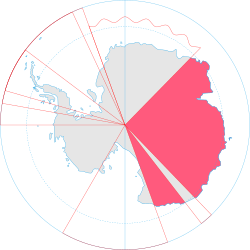Australian Antarctic Territory | |
|---|---|
 Map of Antarctica indicating Australian territorial claim (red area) | |
| Sovereign state | |
| British claim | 1841 |
| Claim transferred to Australia | 1933 |
| Main base and administrative centre | Davis Station 68°34′36″S 77°58′03″E / 68.576667°S 77.9675°E |
| Official languages | English |
| Government | Dependency under a constitutional monarchy |
• Monarch | Charles III |
| Sam Mostyn | |
• Australian government minister | Tanya Plibersek |
• Chief Scientist | Nicole Webster |
| Area | |
• Total | 5,896,500 km2 (2,276,700 sq mi) |
| Population | |
• Estimate | less than 1,000 |
| Currency | Australian dollar (AU$) (AUD) |
| Calling code | +672 1x |
| Internet TLD | |
The Australian Antarctic Territory (AAT) is a part of East Antarctica claimed by Australia as an external territory. It is administered by the Australian Antarctic Division, an agency of the federal Department of Climate Change, Energy, the Environment and Water. The territory's history dates to a claim on Enderby Land made by the United Kingdom in 1841, which was subsequently expanded and eventually transferred to Australia in 1933. It is the largest territory of Antarctica claimed by any nation by area. In 1961, the Antarctic Treaty came into force. Article 4 deals with territorial claims, and although it does not renounce or diminish any pre-existing claims to sovereignty, it also does not prejudice the position of Contracting Parties in their recognition or non-recognition of territorial sovereignty. As a result, only four other countries — New Zealand, the United Kingdom, France, and Norway — recognise Australia's claim to sovereignty in Antarctica.[1]
- ^ Humane Society International Inc v Kyodo Senpaku Kaisha Ltd FCA 3 (15 January 2008), Federal Court of Australia, §13.